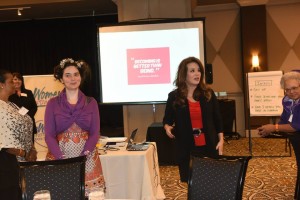Posts Tagged as "Carol Dweck"
Afraid your math teacher will judge you?
Monday, February 15th, 2016Me (on the left) attending a workshop with Sandra Yancey (right), one of the most powerful female entrepreneurs in the world. I love the Carol Dweck quote in the background… “Becoming is better than being.”
This past week I got to attend an entire day-long workshop with Sandra Yancey, one of the most powerful female entrepreneurs in the world. This woman grew a huge national network and multi-million-dollar business from a handful of business cards. She is a powerhouse!
Out of the entire day, one of the things she said that struck me the most was, “We cannot thrive unless we have a place where we can be real.”
This is completely true for me personally – and why it’s essential for me to have my own mentor and my own colleagues and friends that I can be truly real with.
And I know it’s also so true for my students.
For example, I was recently in a session with one of my students, talking about whether or not she would ask her math teacher a particular question.
She stopped and said, “I’m afraid he’ll judge me.”
Wow! That is EXACTLY how I felt so many times when *I* was struggling with math growing up!
I had just never articulated it to myself before.
Even with math teachers who were really nice to me, sometimes even the niceness felt like a form of judgement. I’m highly sensitive, so I could FEEL it when someone was internally exasperated, but trying to act patient when I asked a question about something I “should have” already had down.
Is this something that you’re struggling with? Are you afraid that if you ask questions in class, your teacher will judge you?
(This can be especially difficult if you are a great student in every other subject. You’re used to doing your best and SHINING in the classroom when you participate, but with math, instead of shining, you fear that if you ask your questions, you’ll be judged or even feel ASHAMED that you don’t already know the answer.)
If this is what you’re facing, here’s what I recommend:
1. First, let yourself acknowledge this feeling. Don’t ignore it. Pay attention to it.
Why? If you ignore it, you will just subconsciously shut down on some level. You’ll stop seeking help, and on some level, you might even stop believing that anyone CAN help you, and that you’re doomed to feel this way forever.
It’s OK to recognize that asking for help in a particular situation, or asking for help from a particular person, might not be the best way to master the material.
2. Second, don’t judge yourself. When there’s a disconnection between your learning and how things are being taught in the classroom, it can be easy to start to despair or even start telling yourself things like “I’ll never get this… I must just not be a ‘math person’… maybe my brain is just not made for math… What is wrong with me, I am so good at every other subject… How can I be trying so hard and still be so confused…”
Emotions have a huge impact on learning, especially when we’re being challenged like never before. Be compassionate with yourself. Remember, math is a skill that you can acquire with persistent effort. There’s just some kind of disconnect happening between how you’re being taught and what you need to truly master the material. Nothing is wrong with you. Just be gentle and kind with yourself. ESPECIALLY if you are afraid others won’t be gentle and kind with you.
3. Third, be SUPER CLEAR with yourself exactly what it is that you have a question about. When you start to feel overwhelmed about math, it’s easy to look at something and just completely give up because your eyeballs don’t recognize it right away. It’s a completely natural human response – and, it’s also a very knee-jerk, superficial way of engaging with the material.
Take a deep breath. Take a break. Then come back to the material and look at it so, so slowly. Try to take it apart. Ask yourself questions. Why are they doing this specific step here? Does it remind you of something you already know how to do? Let yourself read the math book and do the problem at like one mile per hour.
Try to refine your question from something super general like “I have no idea what’s happening here and I just want to burst into tears and throw this book out the window” to “OK, why did they substitute ‘u’ in for ‘x’? How did they get from step 2 to step 3? Where can I see another example?”
Paradoxically, getting super clear with yourself about EXACTLY WHAT YOU’RE CONFUSED ABOUT is a way to… un-confuse yourself. I promise!
4. Finally, find a place to ask your math questions where you aren’t afraid of being judged. A place where it is safe to be real. Your math classroom and math textbook are not the only source of math knowledge. Try your friends, your peers, teachers you’ve had in the past that you understood better, a different textbook, an online video.
Or, if you’d like to explore whether my magical one-on-one math tutoring programs would be a fit for you and your family,
just click here to get started with your special application. Once your application is received, we’ll set up a special phone call to get clear if my approach would be a good fit for your child. I look forward to connecting!
Related posts:
Face your fears, get a higher grade
Math student’s bill of rights
I just can’t keep this a secret any longer
Case study: confused by math instruction in a foreign language
Comment on this post (2)







